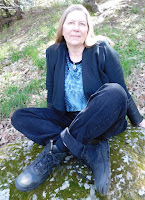The night a sullen yellow haze develops on the horizon, Dr. Alberta Chen, formerly of the Centers for Disease Control, had been working on a chemical agent which turns people – especially women – into beasts. That night, Margie Peach transforms into a dog after picking up a young, pregnant stranger named Stella outside Barstow, California. Wanda Lubiejewski finds herself cradling a young girl in her bear jaws. A ship sails aground San Diego, its crew replaced by exotic animals. Mount Fuji erupts, while The Euphrates runs dry. The Vice President turns into a Bichon Frise. The President has declared war on all nations from his underground bunker. And, as the leader of the free world grows more sickly and ill, Dr. Chen discovers she is growing scary incisors and a tail.
READ A SAMPLE CHAPTER:
I had a chance to interview the author to learn more.
Why did you decide to write this book?
There is so much for mothers to worry about in the world right now. The Book of Dog I asked myself--ok, what's the worst thing that could happen? What if it were the literal end of the world? And I wrote a story where a young mother prevails even then. The Book of Dog is meant to be light-hearted and optimistic and fun, but I also hope it helps people, especially mothers, feel their own power to go out and make the world a better place for the next generation.
Can you explain a little bit about what you drew from the book of Revelation?
The Book of Dog is not a religious book but images and events as described in the Book of Revelation were a vivid source I drew on. I started with this idea: What would it be like if the literal end of the world started to happen, exactly as described in Revelation? I imagined that people would try to ignore the truth and would carry on as usual for as long as they could. So my characters do just that, frequently in an exaggerated and comical way. They dismiss all they hear as "fake news." There are many sentences that quote from Revelation and these dropped in casually while people keep acting as if it's normal times. For instance in the second chapter there is a casual mention that "a third of the trees on the planet were burning."
 My book is about six women who are completely ordinary, including their ordinary kindness and compassion and willingness to care for others. In my novel these ordinary traits are what end up saving the world. I guess I think ordinary people are frequently remarkable.
My book is about six women who are completely ordinary, including their ordinary kindness and compassion and willingness to care for others. In my novel these ordinary traits are what end up saving the world. I guess I think ordinary people are frequently remarkable.
What do you hope readers will get out of your book?
First, I want readers to feel delighted and entertained--to sit down and put their feet up and read a fantastic and optimistic adventure tale. Second I want readers to recognize a little bit of themselves in these characters, and to feel empowered to go out and change the world a little bit themselves. We all have that power.
As the world appears to be coming to an end, six unlikely women will make a perilous journey to the Pit of Nethalem, where they will stop the Beast from fulfilling his evil purpose or die trying.
As the world appears to be coming to an end, six unlikely women will make a perilous journey to the Pit of Nethalem, where they will stop the Beast from fulfilling his evil purpose or die trying.
A work of startling and cinematic originality, The Book of Dog threads together politics, religion, demon possession, motherhood, love, betrayal, and easy-going bestiality. A ridiculously plausible story set in an alternate America, it wryly explores how even the most insignificant and powerless of people, when working together, can change the world for the better.
ABOUT THE AUTHOR:
Lark Benobi (http://larkbenobi.com/) is the pen name of Claire Tristram, a freelance journalist and author. She is a four-time Article of the Year winner from the American Society of Journalists and Authors. Benobi is a contributor of fiction and articles to anthologies and to periodicals, including Wired, Salon, Fast Company, New York Times, Chicago Tribune, Fiction International, Hayden's Ferry Review, Massachusetts Review, Alaska Quarterly Review, North American Review. She holds degrees from Stanford University, B.A. (Comparative Literature); Cornell University, M.B.A. and M.A. (Asian Studies); and also attended Albert-Ludwigs University (Freiburg, Germany) and Tsukuba University (Japan). Her book, After (Farrar, Strauss, Giroux, 2004) received acclaimed reviews from People, Entertainment Weekly, Publishers Weekly, Kirkus and Library Journal, among others.


No comments:
Post a Comment